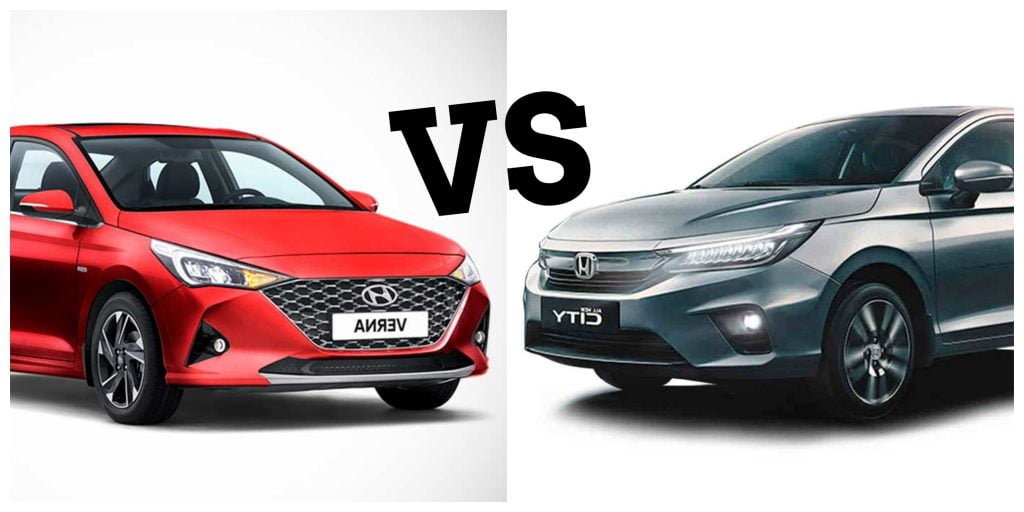Here’s a classic turbocharged vs naturally aspirated engine fight with the Hyundai Verna vs Honda City in a 0-100 kph acceleration test and 20-80 kph roll-on acceleration test. What are your guesses?
The recent trend and influx of small capacity turbo-petrol engines in our country is hard to ignore. These downsized turbo-petrol engines actually produce more or less the same power and torque or in some cases, even more than slightly larger naturally aspirated petrol engines. The best example in this case would be the new Honda City and the Hyundai Verna. Both the sedans are at par with each other in terms of power but the Verna has the edge with considerably more torque, thanks to a turbocharger. So here’s a classic performance test of naturally aspirated vs turbocharged engines, the Honda City vs Hyundai Verna.

| Hyundai Verna Turbo | Honda City CVT | |
| Engine | 1.0-litre Turbo-petrol | 1.5-litre Naturally Aspirated Petrol |
| Power | 120hp @ 6000rpm | 121hp @ 6600rpm |
| Torque | 172Nm @ 1500rpm to 4000rpm | 145Nm @ 4300rpm |
| Transmission | 7-speed dual-clutch automatic | 7-step CVT |
But first, lets have a look at the powertrain options on offer with each of these sedans. For the sake of simplicity, we are comparing only the automatic variants of both the sedans. The City is powered by a 1.5-litre naturally aspirated petrol engine with 121hp and 145Nm of torque and it comes mated to a 7-step CVT gearbox. Meanwhile, the Verna is powered by a 1.0-litre turbo-petrol engine that produces 120hp and 172Nm of torque. The Verna gets a 7-speed DCT gearbox. The two sedans are thus worlds apart with their powertrain and while they are equally matched on power, the Verna has 27Nm of additional torque. And that is what really matters with acceleration.
| Hyundai Verna Turbo | Honda City CVT | |
| 0-100kmph | 12.03 seconds | 12.74 seconds (Wet) |
| Kickdown Mode (20 to 80kmph) | 7.78 seconds | 7.25 seconds |
This performance test was conducted by Zigwheels and for the Honda City, it was in wet conditions. As you can see, the Hyundai Verna was just a tad bit faster than the Honda City in 0-100 kph acceleration test. However, the City might have fared better in drier conditions. They also pointed out that the Verna turbo could have performed even better but the 7-speed DCT gearbox does not allow the car to be launched hard, thus affecting the 0-100 kph time. In another test by Zigwheels, the same engine with a 6-speed manual gearbox in the Venue Turbo did the 0-100kph sprint in 10.99 seconds, 1.04 seconds faster than the DCT equipped version.
Also Read : Here’s a Real World Driving Range Test for the Hyundai Kona EV!
The Honda City being powered by a naturally aspirated engine produces its peak torque much higher in the rev range at 4,300 rpm. Meanwhile, the Hyundai Verna not only has the advantage with numbers, but it also produces peak torque much lower on the rev range, from 1,500 – 4,000 rpm. This inevitably helps the Verna get better off the line. The fast shifting DCT gearbox also makes a difference on the Verna compared to the more relaxed shifts from the CVT gearbox in the Honda City. However, the picture changes in the roll-on acceleration test.
Also Read : Check Out The 0-100 kph Time of Each Variant of the Kia Sonet!
In roll-on acceleration from 20-80 kph, it is the Honda City that manages to beat the Hyundai Verna, again by a fraction. But that’s despite the nature of their individual gearboxes and that’s really a surprise. Engines with CVT gearboxes tend to shoot up the revs when you put your foot down while the corresponding rise in actual speed is lesser. Both these sedans are currently the most fresh in their segment and will be the most popular as well. However, in this performance test of Honda City vs Hyundai Verna, there’s very little separating both the sedans and you’ll be good with both.
The post Hyundai Verna vs Honda City – 0-100 kph Acceleration Test! appeared first on Car Blog India.
from Car Blog India https://bit.ly/3joaFld
Comments
Post a Comment